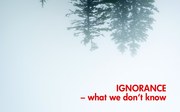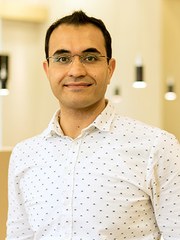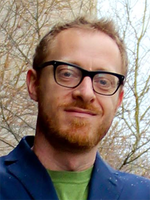Videomitschnitte der Lunch Lecture Reihe "Ignorance - what we don't know" 2018
DIE FRIAS WEBSITE IST UMGEZOGEN. SIE ERREICHEN AKTUELLE INFORMATIONEN UNTER DER NEUEN DOMAIN: HTTPS://UNI-FREIBURG.DE/FRIAS/
 This lunch lecture series leads us to the frontiers of research, its greatest challenge and, some may say, its greatest enemy: what it is that we don't know, and that maybe we will never know! Or: that we don't know yet! Or: that we don't even know yet that we don't know! Or: that we don't want, or should not want to know! Or: that we are not supposed to know! And in the latter case: who then is it who doesn't want us (academics, ultimately society) to know?
This lunch lecture series leads us to the frontiers of research, its greatest challenge and, some may say, its greatest enemy: what it is that we don't know, and that maybe we will never know! Or: that we don't know yet! Or: that we don't even know yet that we don't know! Or: that we don't want, or should not want to know! Or: that we are not supposed to know! And in the latter case: who then is it who doesn't want us (academics, ultimately society) to know?
From the different perspectives of a highly diverse set of academic disciplines and research cultures, FRIAS Fellows will address these and other questions relevant for shedding light on ignorance. With the introductory lecture by Matthias Groß, co-editor of the “Routledge Handbook of Ignorance Studies”, the lecture series will also build on recent research in the fields of „ignorance studies“ and „agnotology“. The latter tackles the production of ignorance, for example ignorance about the dangers of climate change, smoking, nuclear power, fracking, or sugar in soft drinks.
Ignorance is nothing to be ignored! It has many fascinating dimensions, as we shall see and explore, in science as much as in society.
Back to the Unknown: How Ignorance can be Useful, May 3, 2018
Prof. Dr. Matthias Groß, Department of Urban and Environmental Sociology, Helmholtz Centre for Environmental Research - UFZ Leipzig
Ignorance has traditionally been rendered a deficient state of being. However, the unknown is favored in science since scientists use well-defined ignorance to direct their research. With each problem solved unsolved problems and thus new horizons regarding the unknown become visible. Answers do not simply resolve questions, they provoke new ones. In an alleged post-truth world and an era of alternative facts, it seems important to analyze ever new unknowns in order to better understand why and when ignorance in the media, in everyday life, or in science and engineering may have certain effects towards decision making and the construction of “facts.” In this way, I will discuss some categories on how to analyze nonknowledge in order to raise awareness of its normality and to illuminate ignorance as regular rather than deviant. After all, it appears to be the ignorance of ignorance that is the biggest barrier to new knowledge.
Answering a Question is (Usually) a Hopeless Task, May 17, 2018

Dr. Oliver Bräunling, Mathematics, University of Freiburg
The rules of chess are very simple. Yet, winning a game of chess can be very hard. This is an example of a general phenomenon: Even though something is guided by simple principles, their implications can be very involved and hard to analyse. Conversely, there are some very complicated games which are easy to win, "once you know the trick". We shall discuss a little the problem how to estimate whether a question is 'hard to answer', and contrast it to the human desire for simple answers.
“Father of Ignorance”: How and Why Marginal Figures within Islam Remain Marginal, June 7, 2018

Dr. Majid Daneshgar, Religion and Islamic Studies, University of Otago
Sources for the history of Islam are replete with the names of people who seem to have played a significant role in shaping the religion and/or community of Islam. However, many such individuals have been marginalized, in both the historical sources and modern studies of Islam. This lecture will examine the reasons for and processes of marginalization in both historical texts and modern academic works.
Hidden Rituals in Medicine, June 14, 2018
Dr. phil. Stefan Schmidt, Psychosomatic Medicine and Psychotherapy, University Medical Center Freiburg
 Medical science conceptualizes the human body mostly as a biochemical machine governed by linear causal relationships. Medical interventions are designed according to the same model of cause and effect. Research in psychotherapy, placebo and psychosomatics proves this model to be incomplete since it demonstrates the impact of the mind on bodily functions. But in the last 60 years certain research methods have been established as gold standard that avoid to seethese consciousness related effects since they cannot be conceptualized in the standard biochemical paradigm. As a consequence, many effects of mental, consciousness and even social conditions are falsely attributed to causal interventions such as drugs and surgery. Seen from this perspective, modern medicine is full of hidden rituals, which are reinforced by research results and which cannot be seen by the current paradigm and research methodology.
Medical science conceptualizes the human body mostly as a biochemical machine governed by linear causal relationships. Medical interventions are designed according to the same model of cause and effect. Research in psychotherapy, placebo and psychosomatics proves this model to be incomplete since it demonstrates the impact of the mind on bodily functions. But in the last 60 years certain research methods have been established as gold standard that avoid to seethese consciousness related effects since they cannot be conceptualized in the standard biochemical paradigm. As a consequence, many effects of mental, consciousness and even social conditions are falsely attributed to causal interventions such as drugs and surgery. Seen from this perspective, modern medicine is full of hidden rituals, which are reinforced by research results and which cannot be seen by the current paradigm and research methodology.

Dr. Stefan Buhmann, Physics, University of Freiburg
Classical mechanics offers a very tidy picture of the universe as a smoothly running machine where the motion of each element is completely predetermined from its initial position and velocity. On the contrary, the findings of quantum physics teach us that processes in the microscopic world are inherently random. Even worse, according to the Heisenberg uncertainty principle, such basic properties as position and velocity cannot be known simultaneously. I will try to give an introduction of our apparently unavoidable ignorance of what is really going on in the realm of quantum physics.
Ignorance and the Law: the Unknown, the Ignored and the Secret, June 28, 2018
 Prof. Dr. Lorena Bachmaier, Law, Complutense University of Madrid
Prof. Dr. Lorena Bachmaier, Law, Complutense University of Madrid
Lady Justice – Iustitia – should be blind and is allegorically represented with a balance and a sword in her hands. Does this mean that justice shall ignore certain knowledge or simply ignore certain facts? And what does the balance symbolise?
These are concepts that have been discussed ever since the inception of legal science, and are still subject to discussion. It also shows how the usual approach to unknown questions and ignored issues in other scientific fields may not be valid in the context of legal science. Considering the object of study is a normative system – actual or potential –, the function of the legal scientists resembles that of social engineering, but with limited tools to empirically check the effectiveness of the legal solutions and much of the research output. At the same time, while effectiveness might be impossible to measure and thus remains ignored, there are other fields where secrecy might be the only way to achieve effectiveness. Ignorance, knowledge and secrecy in the legal sciences might have other meanings, or not?
 Prof. Dr. Anne Harrington, History of Science and Medicine, Harvard University
Prof. Dr. Anne Harrington, History of Science and Medicine, Harvard University
The psycho-pharmaceutical industry is in a crisis. It is haunted by claims that its antidepressant drugs barely perform better than placebos. It has also learned that certain drugs which previously “beat” placebos in clinical trials no longer do.
This crisis is partly of its own making. The randomized placebo-controlled trial that is used to test drugs has the effect of creating, not just knowledge but ignorance. In such trials, the placebo effect is the “noise” in the system. The goal is to measure it, in order to dismiss it. The question is always whether a real drug causes more improvement than a fake (placebo) drug. This improvement is imagined to float like precious oil on the surface of the placebo waste water. No one is supposed to care about “the water.”
But today they do. In this talk, I will tell the story and tease out some of its implications.
 Prof. Dr. Paolo Silvestri, Legal and Political Philosophy, University of Torino
Prof. Dr. Paolo Silvestri, Legal and Political Philosophy, University of Torino
Do we know how much we as citizens/taxpayers pay to the state and how much we receive from it? Do we, or should we, really care about the knowledge of burdens and benefits of taxation? And, if so, why?
The “Theory of fiscal illusion”, first developed by the Italian Amilcare Puviani (1903), addressed these issues by pointing out our ignorance, wrong representation, or misperception of burdens and benefits of taxation. This theory has been widely deployed to explain a set of current problems as diverse as the size of public sector and public debt, the lack of fiscal democracy, or the political business cycle.
By drawing on this literature, in this talk I will try to: 1) distinguish between different kinds of ‘illusion’ and ‘ignorance’; 2) analyze the diverse attempts to face their troubling societal implications; 3) understand if and how the problem of the knowledge of burdens and benefits of taxation might hide a different normative problem, namely the issue of tax justice.
The Myth of Ignorance in Biology, July 19, 2018
Prof. Dr. Gunther Neuhaus, Vice Rector and Vice-President for Research, University of Freiburg
From the ignorance of facts to the question: does science need ignorance? This lecture will offer a biological journey through the theory of science, starting out from the key question how we gain information science, followed by a discussion of genetical engineering, and ending with some important moments in the daily life of a scientist (such as having a beer in the faculty club).

